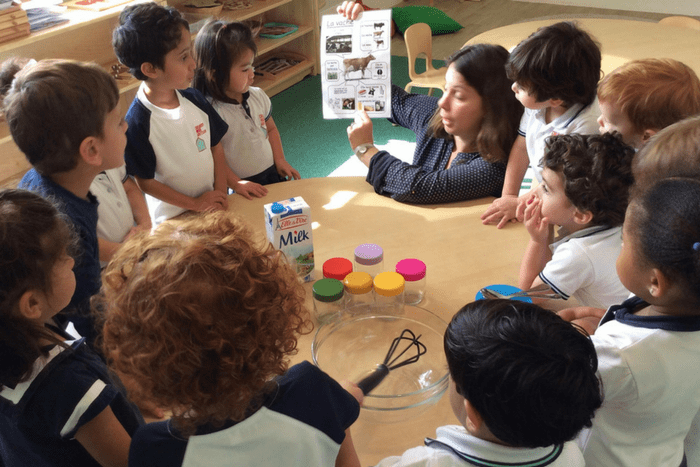Children’s House Montessori in Khalifa City, Abu Dhabi, offers a trilingual programme for Little Montessorian children aged 2 ½ years and above. English is the primary spoken language, but the nursery also offer Arabic, delivered by a native Arabic teacher, and a French class delivered by a native French speaking qualified Montessori Teacher.

As an early years education provider, Children’s House Montessori strive to provide a welcoming, safe and secure environment where all cultural backgrounds are valued and respected and where diversity and multilingual children, and their families, are nurtured. They recognize that children are natural and active learners, who have the capacity to learn more than one language at any given time, but with apparent ease and without effort before the age of 5 years. The Montessori classroom is a language-rich environment where children have the freedom of speech and where their language skills are enhanced through participation in all areas of the curriculum. Children are given individual and group presentations, where the precise terminology of the objects and activities used are being taught. Children also develop their language skills, and extend and widen their vocabulary and understanding of language by singing songs, listening to stories, and through interaction and conversation with their teachers and friends. At Children’s House Montessori, the experienced team encourage participation in collaborative games involving naming and counting, sorting, matching, and labelling activities, which introduce many new concepts and vocabulary into the language taught to further support each child’s developing language skills.
Introducing children to the French language and culture in a creative and innovative way
French classes are led by Ms Gwen, the Montessori Curriculum Coordinator. Ms Gwen is a native French speaker and introduces children to the French language and culture in a creative and innovative way by singing lots of songs and listening to French stories, making the children’s learning experiences fun and interactive. Miss Gwen is a strong advocate of the notion that young children develop very good pronunciation and have the ability to remember and copy new sounds and accents effortlessly. They also have the natural capacity to imitate what they hear with ease and without questioning. Through expressive language, children are more confident to speak in front of their peers and are happy to explore new tasks.
Supporting Arabic through interactive activities
The nursery’s qualified Early Years Arabic Teacher, Ms Rafika, supports children who have Arabic as their first language and introduces Arabic through various interactive activities to those children who are non-native speakers. Our Arabic area is well equipped and we have many Montessori materials to support each child’s developing language skills, such as ‘I Spy’ boxes, sandpaper letters, a large moveable alphabet, matching cards, sequencing cards, shapes, colour activities and a selection of animal pictures.
Learning another language develops a child's self-confidence and self-esteem
Learning French, Arabic, or any other language develops a child’s self-confidence and self-esteem; two important areas of development that the Montessori philosophy and pedagogy strongly promotes and fosters.
There are, however, many misconceptions surrounding multilingualism. Many of them are not true and below are some examples:
Myth: The mind has limited space for languages and by introducing another language you are reducing the child’s ability in each language
Truth: Much research has been conducted to offer a counter narrative; for instance, the research of Mac-Ileod-Brundell (2008) who posits ‘ … there are many benefits for children becoming bilingual; greater linguistic awareness, cognitive flexibility and problem solving.’
Myth: Children get confused by learning more than one language
Truth: Again, research provides a counter narrative, as argued by Whitehead’s (2002) who suggests that ‘… many of the apparent linguistic ‘mistakes’ made by young multilingual learners are highly successful strategies for language learning’.
The highly skilled teachers and support staff at the Children’s House Montessori are experienced in supporting children learning additional languages. Being part of the Abu Dhabi community where many families are expatriates, they recognize and understand the challenges children encounter when they are learning a new language.
If you would like to find out more about Children’s House Montessori nursery and their trilingual programme, please call 02 444 1150 to make an appointment for a visit. Alternatively please visit www.thechildrenshousemontessori.com or email [email protected]
References:
Clarke, P. (1992) English as a second language in Early childhood, Melbourne, Victoria: Victoria Free Kindergarten Association
Datta, M (2007) Bilinguality and Literacy: Principles and Practice, London: Continuum
MacIleod-Brudenell, I. (2008) Advanced Early Years – 2nd ed, Heinemann: Harlow
Whitehead, M. (2002) Developing Language and Literacy with Young Children, London: Chapmann

